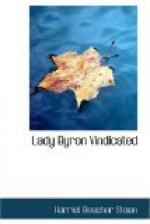Now, we propose a different course. As Lady Byron is not stated by her warm admirers to have had any monomania for speaking untruths on any subject, we rank her value as a witness at a higher rate than Lord Byron’s. She never accused her parents of madness or suicide, merely to make a sensation; never ‘bammed’ an acquaintance by false statements concerning the commercial honour of anyone with whom she was in business relations; never wrote and sent to the press as a clever jest false statements about herself; and never, in any other ingenious way, tampered with truth. We therefore hold it to be a mere dictate of reason and common sense, that, in all cases where her statements conflict with her husband’s, hers are to be taken as the more trustworthy.
The ‘London Quarterly,’ in a late article, distinctly repudiates Lady Byron’s statements as sources of evidence, and throughout quotes statements of Lord Byron as if they had the force of self-evident propositions. We consider such a course contrary to common sense as well as common good manners.
The state of the case is just this: If Lord Byron did not make false statements on this subject it was certainly an exception to his usual course. He certainly did make such on a great variety of other subjects. By his own showing, he had a peculiar pleasure in falsifying language, and in misleading and betraying even his friends.
But, if Lady Byron gave false witness upon this subject, it was an exception to the whole course of her life.
The habits of her mind, the government of her conduct, her life-long reputation, all were those of a literal, exact truthfulness.
The accusation of her being untruthful was first brought forward by her husband in the ‘Clytemnestra’ poem, in the autumn of 1816; but it never was publicly circulated till after his death, and it was first formally made the basis of a published attack on Lady Byron in the July ‘Blackwood’ of 1869. Up to that time, we look in vain through current literature for any indications that the world regarded Lady Byron otherwise than as a cold, careful, prudent woman, who made no assertions, and had no confidants. When she spoke in 1830, it is perfectly evident that Christopher North and his circle believed what she said, though reproving her for saying it at all.
The ‘Quarterly’ goes on to heap up a number of vague assertions,—that Lady Byron, about the time of her separation, made a confidant of a young officer; that she told the clergyman of Ham of some trials with Lord Ockham; and that she told stories of different things at different times.




